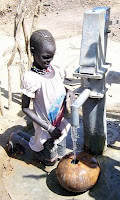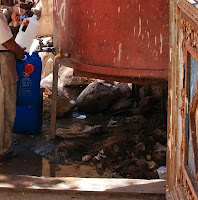-
PODCAST – Forests for the Future: Family Planning in Nepal’s Terai Arc Landscape
›April 3, 2009 // By Wilson Center Staff“The Terai Arc Landscape has a very high population growth rate; people are very much dependent on the natural resources,” says Sabita Thapa in this podcast from the Environmental Change and Security Program.“We are especially working through the population, health, and environment project to address the issues of forest conversion, forest encroachment, and fuel extraction,” explains Thapa
 .
. In this podcast, Thapa, now an environmental advisor with the United Nations Development Programme in the Solomon Islands, and Dhan Rai, senior project manager with World Wildlife Fund-Nepal, discuss WWF’s PHE program in Nepal’s Terai region.
To learn more about PHE in Nepal, read FOCUS Issue 18, “Forests for the Future: Family Planning in Nepal’s Terai Region.”
And for additional resources, please visit our PHE webpage.
Photo: Sabita Thapa. Courtesy of Meaghan Parker. -
At the Fifth World Water Forum, Africa Steps Up
› A record-breaking 28,000 people, including five heads of state, participated in the Fifth World Water Forum in Istanbul, Turkey, last month. I was there, too, excited to be discussing this year’s theme, “Bridging Divides for Water.” Much of the conversation centered on how to bridge the remaining divides in meeting the Millennium Development Goals (MDGs)—especially MDG 7, which aims to halve the proportion of people without sustainable access to safe drinking water and basic sanitation by 2015.
A record-breaking 28,000 people, including five heads of state, participated in the Fifth World Water Forum in Istanbul, Turkey, last month. I was there, too, excited to be discussing this year’s theme, “Bridging Divides for Water.” Much of the conversation centered on how to bridge the remaining divides in meeting the Millennium Development Goals (MDGs)—especially MDG 7, which aims to halve the proportion of people without sustainable access to safe drinking water and basic sanitation by 2015.
While notable progress has been made in many regions of the world, such as China and India, other areas, particularly sub-Saharan Africa, lag woefully behind. According to the most recent numbers (2006) by UNICEF and the World Health Organization, only 31 percent of the population in sub-Saharan Africa has access to sanitation, and there are 38 sub-Saharan African countries where sanitation coverage is less than 50 percent. Access to improved drinking water sources has increased to 64 percent across the region; however, increases in coverage are not keeping pace with population growth, and the current rate of provision is not adequate to meet the MDG drinking-water target.
The Fifth World Water Forum, however, marked a hopeful new development. For the first time, the region of the world with the most serious water challenges, Africa, used the Forum to announce an internally driven water and sanitation agenda with a united voice. With support from the African Development Bank, the African Union and the African Ministerial Conference on Water (AMCOW) unveiled a plan to implement existing political commitments to water and sanitation. An “Africa Regional Paper” informed by the First African Water Week, held in Tunis in March 2008, presents African perspectives on each of the themes of the Forum (global change and risk management; advancing human development and the MDGs; managing and protecting water resources; governance and management; finance; education, knowledge, and capacity development), with a key message of delivering on existing commitments. In response to this agenda, the G8 countries announced increased aid to Africa’s water sector.
The desire to solve the world’s water crisis has generated many reports and frameworks over the years, including the Brundtland Commission’s report “Our Common Future” and the World Water Forum process itself. But perhaps nothing is as effective as a proactive, united stance from sub-Saharan Africans themselves, which could go a long way toward ensuring aid is used appropriately and efficiently. The fact that South Africa will host the Sixth World Water Forum in March 2012 should provide another impetus for meeting water and sanitation targets on the continent.
Hope Herron is an environmental scientist with Tetra Tech, Inc. She is currently researching water security issues in the context of the new U.S. Africa Command and U.S. defense, diplomacy, and development frameworks.
Photo: A Sudanese girl fills a water jug at a pump. Courtesy of Flickr user Water for Sudan. -
‘60 Minutes’ Gives Community-Conservation Programs Short Shrift
›April 1, 2009 // By Rachel Weisshaar60 Minutes correspondent Bob Simon recently reported on how African herders are poisoning lions, which sometimes kill herders’ livestock, with Furadan, a highly lethal pesticide (video; transcript). Today, there are only 30,000 lions in Africa, down from 200,000 twenty years ago.
Although Simon did mention “the Lion Guardians, a group of reformed Maasai warriors who keep track of collared lions and warn herders when the lions get too close to their cattle,” he failed to highlight other, more comprehensive community conservation programs in the area, such as the Il Ngwesi Group Ranch. I mention Il Ngwesi in particular because its health and conservation programs coordinator, Kuntai Karmushu, actually appears in the 60 Minutes segment, alongside Mengistu Sekeret. The Il Ngwesi ranch has successfully used a multisectoral approach to protect wildlife and promote rural development. Eighty percent of the ranch’s 16,000 hectares are devoted to conservation efforts, including a very successful ecotourism endeavor that Karmushu calls “the Il Ngwesi backbone.” Il Ngwesi’s ecotourism enterprise—which employs community members, is run sustainably by the community, and directs revenue back into the community—has enjoyed steadily increasing revenue since 1999.
The Il Ngwesi ranch has successfully used a multisectoral approach to protect wildlife and promote rural development. Eighty percent of the ranch’s 16,000 hectares are devoted to conservation efforts, including a very successful ecotourism endeavor that Karmushu calls “the Il Ngwesi backbone.” Il Ngwesi’s ecotourism enterprise—which employs community members, is run sustainably by the community, and directs revenue back into the community—has enjoyed steadily increasing revenue since 1999.“The amount of tourism that’s here is not sufficient to offset the cost of these people living with wildlife,” says Tom Hill, an American philanthropist who has set up a fund to compensate Masaai for livestock losses due to lions, in return for not killing the lions. But Il Ngwesi proves that with a comprehensive approach and local buy-in, conservation can be a smart investment for local people. The ranch’s profits are used for education programs, HIV/AIDS awareness efforts, conservation and security improvements, and infrastructure development. The community participates in spending decisions, which Karmushu says is “one of the key things” driving the ranch’s success. In 2002, it won the UN Environment Programme’s Equator Initiative Prize, which recognizes outstanding local efforts for poverty reduction and biodiversity conservation in the tropics.
ECSP’s website has more on the Il Ngwesi Group Ranch and other successful community conservation projects in East Africa, including video, PowerPoint presentations, and transcripts.
Photo: Kuntai Karmushu. Courtesy of the Wilson Center and Heidi Fancher. -
VIDEO: Duff Gillespie on ‘Making the Case for U.S. International Family Planning Assistance’
›April 1, 2009 // By Wilson Center Staff“One dollar invested in family planning has a return on the investment of four dollars,” says Duff Gillespie in this expert analysis from the Environmental Change and Security Program.
“If you have a program that allows couples to avert having unwanted pregnancies, it also means there are less children to immunize – there are less schools that have to be built – there are less teachers that have to be trained.”
In this short video, Duff Gillespie, professor at the Johns Hopkins Bloomberg School of Public Health, discusses the recent report Making the Case for U.S. International Family Planning Assistance, and the need to increase funding for family planning around the world.
To learn more, please see a full summary and complete video of Duff Gillespie speaking recently at a March 17, 2009, Wilson Center launch of the report. -
Grassroots Efforts Help Achieve Population, Health, and Environment Goals in Nepal
›April 1, 2009 // By Will Rogers “If you want to bring about conservation of these big, iconic species that need lots of area to roam, you have to work with the people that are living there,” said Jon Miceler at a March 19, 2009, event, “Population, Health, and Environment in Nepal.” Miceler, managing director for the World Wildlife Fund’s (WWF) Eastern Himalayas program, and Rishi Bastakoti, director and co-founder of Resource Identification and Management Society Nepal (RIMS Nepal), discussed their ongoing work on population, health, and environment (PHE) programs in Nepal.
“If you want to bring about conservation of these big, iconic species that need lots of area to roam, you have to work with the people that are living there,” said Jon Miceler at a March 19, 2009, event, “Population, Health, and Environment in Nepal.” Miceler, managing director for the World Wildlife Fund’s (WWF) Eastern Himalayas program, and Rishi Bastakoti, director and co-founder of Resource Identification and Management Society Nepal (RIMS Nepal), discussed their ongoing work on population, health, and environment (PHE) programs in Nepal.
Protecting Tigers in the Terai
To protect endangered Bengal tigers in Nepal, WWF seeks to simultaneously protect the ecosystem and support sustainable livelihoods in the Terai Arc Landscape (TAL), a biodiverse region that spans the India-Nepal border. Environmental threats to the Terai include:- Conversion of forest into farmland;
- Overgrazing;
- Forest fires;
- Excessive extraction of timber and fuelwood;
- Poaching;
- Human-wildlife conflict; and
- Population growth.
“By protecting a tiger—which is what we call an ‘umbrella species’—you’re actually protecting a whole host of species below that, and a whole host of ecosystems that are connected with the tigers,” said Miceler.
Piloting PHE in Khata
In the Khata corridor, a region of the TAL, WWF worked with local leaders and community forest user groups to create a “permanent community-managed health clinic with basic clinical tools,” Miceler said. In addition, the program:- Distributed 172 arsenic filters to remove naturally occurring arsenic from the groundwater, as well as 44 hand pumps to provide clean drinking water;
- Improved access to family planning services and increased the contraceptive prevalence rate from 43 percent to 73 percent in two years; and
- Provided 136 biogas plants with attached toilets and 100 improved cookstoves, reducing the need for fuelwood, which in turn decreased deforestation and the number of acute respiratory infections.
WWF will be “taking results from the successes we’ve had in the Khata corridor and lessons learned from other PHE projects in other countries to scale them up in other areas of the Terai,” said Miceler.
PHE at the Grassroots Level
“The average fertility rate in Nepal is 3.1,” said Bastakoti of the Nepalese NGO RIMS Nepal. “But it is much higher among the ethnic communities living in the remote areas with low education.”
RIMS Nepal works with 82 community forest user groups in Dhading to improve livelihoods, health, and environmental conservation. Since 2006, the project has:- Increased the contraceptive prevalence rate from 44 percent to 63.1 percent; and
- Distributed biogas and other improved cookstoves, helping reduce the incidence of acute respiratory illness from 55.5 percent to 5 percent and saving 1,178 metric tons of firewood each year.
RIMS Nepal trained 375 people to be peer educators and community-based distributors of contraceptives. “Local volunteers are key for the success of PHE,” Bastakoti explained. “They become role models for behavioral change.”
In addition, with RIMS Nepal’s help, 24 community forest user groups incorporated PHE activities, including family planning, into their operational plans. The “integration of family planning and health brings added value to conservation, poverty reduction, and livelihood improvement,” said Bastakoti, calling community forest user groups “one of the greatest grassroots-level institutions”—and key to advocating for the PHE approach at the national level.Photo: Rishi Bastakoti. Courtesy of the Woodrow Wilson Center.
-
VIDEO: Joseph Speidel on Population, Health, and Environment
›March 31, 2009 // By Wilson Center Staff“If we could do something about unintended pregnancy – which is about 80 million a year – we could dramatically reduce population growth,” and reduce pressure on the environment, says Joseph Speidel in this short expert analysis from the Environmental Change and Security Program.
Speidel, adjunct professor at the Bixby Center for Global Reproductive Health at the University of California, San Francisco, discusses population, health, and environment issues, and offers solutions for the way forward.
To learn more, please see a full summary and complete video of Joseph Speidel speaking recently at a March 17, 2009, Wilson Center event, “Making the Case for U.S International Family Planning Assistance (Report Launch).”
-
Green Advisers Assisting UN Peacekeeping Troops: Is the Third Time the Charm?
›March 27, 2009 // By Geoffrey D. Dabelko Speaking at the Wilson Center earlier this week, UN Environment Programme (UNEP) Director Achim Steiner said he recently discussed plans with Alain Le Roy, UN undersecretary-general for peacekeeping operations, to integrate environmental awareness into UN peacebuilding efforts. According to a study recently released by UNEP, From Conflict to Peacebuilding: The Role of Natural Resources and the Environment (see New Security Beat post), at least 18 violent conflicts have been fuelled by the exploitation of natural resources since 1990, but fewer than 25 percent of peace agreements for resource-related conflicts address natural resources. Steiner said he is hopeful that putting in “green advisers, so to speak, with blue helmets” could change that.
Speaking at the Wilson Center earlier this week, UN Environment Programme (UNEP) Director Achim Steiner said he recently discussed plans with Alain Le Roy, UN undersecretary-general for peacekeeping operations, to integrate environmental awareness into UN peacebuilding efforts. According to a study recently released by UNEP, From Conflict to Peacebuilding: The Role of Natural Resources and the Environment (see New Security Beat post), at least 18 violent conflicts have been fuelled by the exploitation of natural resources since 1990, but fewer than 25 percent of peace agreements for resource-related conflicts address natural resources. Steiner said he is hopeful that putting in “green advisers, so to speak, with blue helmets” could change that.
As someone who has followed the history of environmental security efforts for a long time, trust me—this is news. It’s not that Steiner’s idea of integrating environmental expertise into peacekeeping is novel; on the contrary, a “Green Helmets” force to respond to environmental conflicts was proposed unsuccessfully by Mikhail Gorbachev in 1989-89 and by then-UNEP Director Klaus Toepfer in 1998. Both of these proposals failed because many countries feared a dilution of the principle of sovereign control over their territory and natural resources. But Steiner’s less-ambitious, more-practical plan to provide environmental advisers to peacekeeping troops seems to hold promise for reducing the environmental impact of conflicts and choking the supply chain of illegal resources fueling them. We may see this new integrated peacebuilding approach in action in the Democratic Republic of the Congo and Haiti.
Stay tuned for the archived video and transcript of Steiner’s talk, which also featured Daniel Reifsnyder of the U.S. Department of State and Andrew Morton of UNEP.
Photo: UNEP Director Achim Steiner. Courtesy of the Wilson Center and Dave Hawxhurst. -
In Yemen, Water’s Role in the War on Terror
›March 27, 2009 // By Will Rogers “Sana’a might very well become the first capital in the world to run out of water,” write Gregory D. Johnsen and Christopher Boucek in a February 2009 article in Foreign Policy. With massive population growth, rapidly shrinking freshwater availability, and weak governance, Yemen’s unsustainable water management policies are exacerbating the threat of international terrorism as the state devolves into a sanctuary for al Qaeda jihadists and other transnational criminals.
“Sana’a might very well become the first capital in the world to run out of water,” write Gregory D. Johnsen and Christopher Boucek in a February 2009 article in Foreign Policy. With massive population growth, rapidly shrinking freshwater availability, and weak governance, Yemen’s unsustainable water management policies are exacerbating the threat of international terrorism as the state devolves into a sanctuary for al Qaeda jihadists and other transnational criminals.
Today, Yemen is among the world’s most water-scarce countries. According to the most recent data collected in 2005, Yemen’s freshwater availability has dropped to a mere 186 cubic meters per capita per year – well below the international water poverty line of 1,000 cubic meters per capita per year. Below that, water begins to severely limit “economic development and human health and well-being.”
And since the latest data collection, according to Johnsen and Boucek, overexploitation of groundwater aquifers to satisfy a burgeoning population has resulted in “dramatically falling water tables—up to several meters per year in some places.”
To make matters worse, an annual population growth rate of 3.2 percent, driven by a total fertility rate of 6.2 children per woman, means the population will grow from 22.2 million today to 35.2 million by 2050, putting further pressure on an already-scarce resource.
In Yemen, the “lack of any serious legal oversight, reckless irrigation techniques, and unregulated private exploitation” are clear indicators of poor governance. Nevertheless, the government has begun working with the World Bank to implement an integrated water management program. “Support for the water sector is receiving high priority,” said Nabil Shaiban of Yemen’s Ministry of Planning and International Cooperation, in an interview with IRIN News.
But despite these efforts, the government’s weakness and the country’s “gun-slinging tribal culture” present serious challenges to water management. According to IRIN News, “tribesmen seize control of water projects nearing completion, intending to use them for irrigating their farms.” This occurs with about “80 percent of projects in rural areas,” Ahmed al-Sufi, an information officer with Yemen’s National Water and Sanitation Foundation, told IRIN News.
And so the problems of poor water management and weak governance are circular. As water scarcity worsens, the government’s attempts to mitigate it are undermined by its weak control over the state. But without successful policies to mitigate water scarcity, the government’s legitimacy is further weakened.
With water woes aggravating Yemeni citizens and weakening the government’s authority, al Qaeda and other transnational terror groups are recruiting jihadists and using ungoverned areas as training grounds and safe havens. Forty-five percent of Yemen’s population is under 15 years old—and some claim al Qaeda is now actively recruiting boys as young as 12. With water scarcity worsening economic and human development, Yemen’s youth are particularly susceptible to al Qaeda’s promises of social justice and opportunities for advancement.
Al Qaeda recently made its capabilities in Yemen clear with a September 18, 2008, attack against the U.S. embassy in Sana’a. Several car bombs and rocket-propelled grenades killed 16 people—the deadliest attack against a U.S. target in Yemen since the bombing of the U.S.S. Cole in 2000. According to The Economist, last March “al Qaeda websites posted a message advising members to head for Yemen.”
To be clear, water scarcity is not the only issue plaguing the Gulf state. Falling oil prices and mismanaged oil reserves are making Yemen’s chronic economic and human development problems much worse. But assistance from the international community in implementing effective water-management policies would lend credibility to the government and could bolster its ability to prevent al Qaeda from training terrorists within its borders.
According to the U.S. Army field manual on stability operations, “The greatest threats to our national security will not come from emerging ambitious states but from nations unable or unwilling to meet the basic needs and aspirations of their people.” If Yemen’s government cannot provide even a minimal level of water security for its citizens, it risks becoming a failed state on par with Somalia or Zimbabwe.
Over the long term, a comprehensive approach to development that balances voluntary family planning with effective natural resource management would help reduce pressure on scarce resources and bring lasting stability to the country, while serving U.S. national security interests in the War on Terror.Photo: In Taiz, south of the capital city of Sana’a, children fill up their water jugs outside a mosque. Courtesy of flickr user Osama Al-Eryani.
 A Publication of the Stimson Center.
A Publication of the Stimson Center.

 .
.  A record-breaking 28,000 people, including five heads of state, participated in the
A record-breaking 28,000 people, including five heads of state, participated in the  The Il Ngwesi ranch has successfully used a multisectoral approach to protect wildlife and promote rural development. Eighty percent of the ranch’s 16,000 hectares are devoted to conservation efforts, including a very successful ecotourism endeavor that Karmushu calls “the Il Ngwesi backbone.” Il Ngwesi’s ecotourism enterprise—which employs community members, is run sustainably by the community, and directs revenue back into the community—has enjoyed steadily increasing revenue since 1999.
The Il Ngwesi ranch has successfully used a multisectoral approach to protect wildlife and promote rural development. Eighty percent of the ranch’s 16,000 hectares are devoted to conservation efforts, including a very successful ecotourism endeavor that Karmushu calls “the Il Ngwesi backbone.” Il Ngwesi’s ecotourism enterprise—which employs community members, is run sustainably by the community, and directs revenue back into the community—has enjoyed steadily increasing revenue since 1999. “If you want to bring about conservation of these big, iconic species that need lots of area to roam, you have to work with the people that are living there,” said Jon Miceler at a March 19, 2009, event, “
“If you want to bring about conservation of these big, iconic species that need lots of area to roam, you have to work with the people that are living there,” said Jon Miceler at a March 19, 2009, event, “
 “Sana’a might very well become the
“Sana’a might very well become the 

